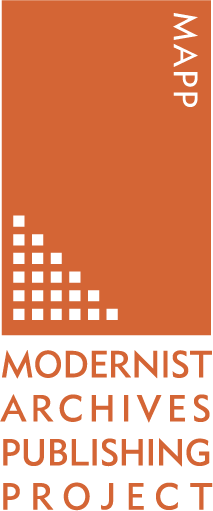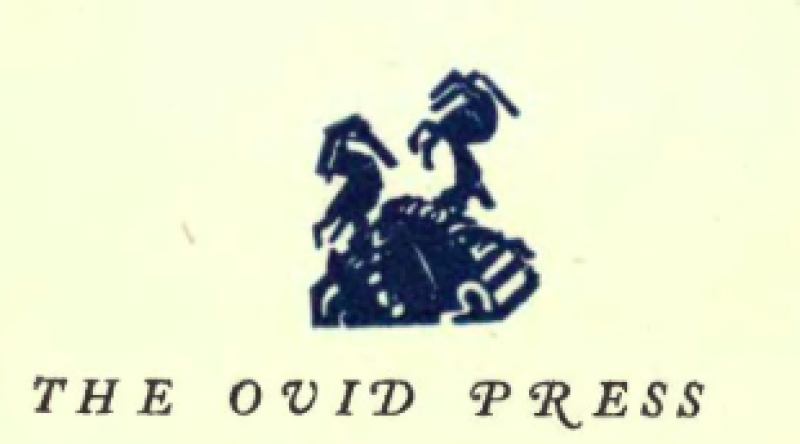Ovid Press
Description
Authored By: Evi Heinz
Edited By: Lise Jaillant
,Edited By: Nicola Wilson
The Ovid Press was a short-lived modernist small press founded in 1919 by John Rodker, an Anglo-Jewish poet and prose writer associated with the Imagist circle around Ezra Pound and the magazine The Egoist. The Ovid Press was Rodker’s first publishing venture and its titles included poetry by Ezra Pound, T.S. Eliot and Rodker himself as well as graphic work by Henri Gaudier-Breszka, Wyndham Lewis and Edward Wadsworth, all hand-printed by Rodker on a Columbian hand press and issued in limited editions of 40 to 500 copies. Rodker operated the press from the house he shared with his wife, the novelist Mary Butts, at 43 Belsize Park Gardens in Hampstead, North London. Butts raised most of the starting capital for the press and was also involved in the printing of at least one Ovid Press title, Rodker’s poetry collection Hymns. Additional funds for the press were provided by friends and colleagues, including May Sinclair and Ezra Pound. The latter appears to have had a major influence on Rodker’s decision to take up publishing, as Rodker indicates in a letter to Pound written in 1930: ‘It is a nice point whether I should have given ten years to this god-damned métier if you hadn’t thought it would be a good thing to have a press’ (qtd in Cloud 13).
One reason behind the founding of the Ovid Press, then, was to provide Rodker and his circle of friends with a means of putting their own work into print. Another was Rodker’s declared aim ‘to bring before the public work that was considered advanced’ (qtd in Cloud 17n25). This cultural mission is reflected both in Rodker’s selection of texts and in their visual presentation. Pound’s Fourth Canto and Hugh Selwyn Mauberley, Eliot’s Ara Vus Prec and Rodker’s Hymns were all printed with a set of decorative capitals designed by Edward Wadsworth who also created the press’s distinctive colophon device, a Vorticist lion-and-unicorn design. Among the press’s graphic publications, the two portfolios of drawings by Henri Gaudier-Brzeska and Wyndham Lewis, published in June 1919 and January 1920 respectively, similarly evoke the radical pre-war aesthetic of the ‘men of 1914’. To these Rodker later added a book of drawings of the Black Country by Edward Wadsworth and a volume of animal woodcuts by the Norwegian artist Roald Kristian, printed in collaboration with the painter Jean Varda. In addition to the Ovid Press publications proper, Rodker also printed some independent projects on his hand press in 1920. This included a catalogue for a Renoir exhibition at the Chelsea Book Club with an essay by Roger Fry, and a previously unpublished poem by Oscar Wilde, printed privately for a book collector (Cloud 77-80, 100-2).
Rodker appears to have been a self-taught letterpress printer, although it has been suggested that his friend David Bomberg, who had lithographical training, advised him on the printing of illustrations (Cloud 18). While the press’s small print runs were generally manageable for an amateur, Rodker’s inexperience nevertheless showed in the less than perfect material construction of the Ovid Press books which often contain typesetting errors and other irregularities (Otty 133-34). The most glaring error, however, a spelling mistake in the title of Eliot’s poetry collection Ara Vus [sic] Prec was down to its author rather than its printer, as Eliot admitted: ‘[T]he correct title of the book is Ara Vos Prec. It only happened to be Vus on the title page because I don’t know Provençal, and I was quoting from an Italian edition of Dante the editor of which apparently did not know Provençal either’ (qtd in Cloud 26).
Despite these defects, the Ovid Press titles were generally well-received within modernist literary circles. Harold Monro, who sold some of the press’s books through his Poetry Bookshop, was the exception in commenting critically on Rodker’s failings as a novice printer and publisher. Disgruntled about the low trade discount the Ovid Press offered to booksellers, Monro also called into question the steep prices of Rodker’s publications, which sold at between 15 shillings and 2 guineas. Rodker, meanwhile, countered that he was more interested in the artistic contents of his books than their material form and defended his pricing strategy as necessary to ensure a reasonable profit for the artist or author.
Though well-intentioned, this business model was not crowned with financial success and, finding himself saddled with ‘more bills than I could have possibly imagined to exist’ (qtd in Cloud 32), Rodker soon had to close his small press. The Ovid Press ceased publication after the appearance of Wadsworth’s The Black Country in September 1920, but Rodker continued to produce independent printing projects on his hand press until 1922. These included a poetry collection by his friend and patron André Germain, published in Paris by Emile-Paul Frères, and circulars for Pound’s Bel Esprit project, a scheme aimed at raising funds to allow T. S. Eliot to leave his job at Lloyds Bank (Cloud 108-15). The Ovid Press colophon device also appears as a watermark on the paper stock that Rodker used for his next major publishing project in 1922-23, a luxurious reprint edition of the twelve-volume Memoirs of Giacomo Casanova di Seingalt. The same paper was used for the printing of the errata sheets that accompanied the second impression of Joyce’s Ulysses which Rodker managed for the Egoist Press in the autumn of 1922 (Cloud 42-49).
Archives and Papers
Charles E. Young Research Library, University of California, Harold Monro Papers, Box 3, Folder ‘John Rodker’
http://www.oac.cdlib.org/findaid/ark:/13030/tf638nb37c/admin/#scopecontent-1.8.4
Harry Ransom Humanities Research Center, Joan Rodker Papers, Box 5, Folder 1, John Rodker’s diary 1919-21
http://norman.hrc.utexas.edu/fasearch/findingAid.cfm?eadid=00170
Harry Ransom Humanities Research Center, John Rodker Papers, Box 9, Folders 5, galley proofs for Hugh Selwyn Mauberley
http://norman.hrc.utexas.edu/fasearch/findingAid.cfm?eadid=00350
Ibid., Box 40, Folder 6, correspondence with Edward Wadsworth
http://norman.hrc.utexas.edu/fasearch/findingAid.cfm?eadid=00350

